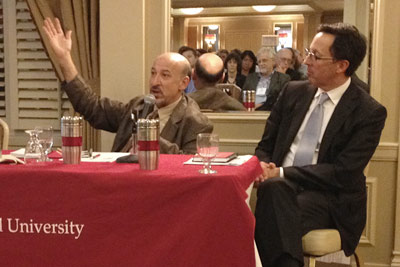New program takes on America's crumbling infrastructure
By Claire Lambrecht

Infrastructure expert Rick Geddes stressed the need to address American infrastructure policy now, while speaking before some 80 people at the launch of the Cornell Program in Infrastructure Policy (CPIP) at the Cornell Club in New York City Sept. 19.
"We're facing a pretty severe infrastructure challenge," said Geddes, Cornell associate professor of policy analysis and management in the College of Human Ecology and director of the new program. "We really need to be innovative about how we're going to approach the severe problems going forward."
CPIP, housed in Cornell's Department of Policy Analysis and Management, is designed to meet that challenge. In addition to providing opportunities for undergraduate and graduate research, the program will bring together members of the private and public sectors through outreach and instruction, with the ultimate goal of influencing the infrastructure debate, Geddes said.
That debate was evident in the panel discussion at the event. The three panelists said that they agreed on the need for innovation in infrastructure policy, and specifically the need to reform funding.
"We have a physical transportation infrastructure that is wearing out due to old age and deferred maintenance," said John Foote '74, Cornell visiting lecturer in city and regional planning, co-founder of TransCore and a senior fellow at the Taubman Center for State and Local Government at the Harvard Kennedy School. "The way we are paying for infrastructure is at odds with sustainability and efficiency," he said.
Though aligned in their diagnosis of the United States' infrastructure challenges, each panelist presented a different prescription for its repair. Foote said that a green mileage fee, similar to a model tested in Portland, Ore., could help alleviate congestion and funding challenges. Mark Joseph, CEO of Veolia Transportation North America, said that P-POP, a form of delegated management used by his firm to restructure transit systems in Long Island's Nassau County and in New Orleans, offered a viable way to cut costs. Germà Bel, professor of economics at the University of Barcelona and author of "The Economics and Politics of High-Speed Rail: Lessons From Experiences Abroad," said that one way of controlling costs is to guard against the seductive quality of grandiose ideas.
"Very good ideas can become taxpayer nightmares," Bel said.
Creating a focal point for discussions like these, particularly in academia, presents an opportunity to improve upon existing policies, Geddes said. "If you can move the needle just a little bit in the United States in regard to public policies toward infrastructure, the social value of that is enormous," he said.
Now is a particularly good time to be building a program like this, said Joseph. "I think we're in the golden age of public transportation, and we're going to get through some of these current budgetary challenges. Gas prices are going to stay high and people need to think differently," he said.
On that point Geddes didn't have to be convinced. "Folks say that when you get to the end of your career you look back, and there are a few highlights," Geddes said. "I think that for me, [this night] will be one of [them]."
The panel discussion was co-sponsored by Cornell Wall Street and the College of Human Ecology.
Claire Lambrecht '06 is a freelance writer in New York City.
Media Contact
Get Cornell news delivered right to your inbox.
Subscribe